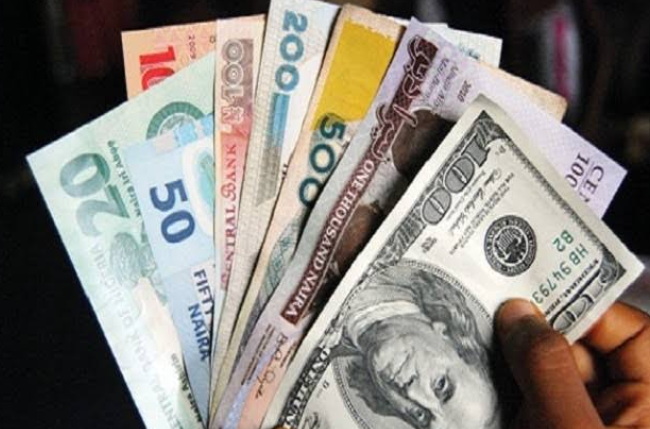News
SEE Dollar to Naira Today Black Market June 17, 2024: USD to NGN CBN Rate

By Kayode Sanni-Arewa
Navigating the Currency Exchange Landscape in Nigeria Navigating the currency exchange landscape in Nigeria requires up-to-date knowledge of the dollar to naira rates. As of June 17, 2024, this comprehensive guide provides the latest exchange rates from both the black market and official windows, including insights from platforms like Geegpay and Grey. Additionally, we’ll explore the factors influencing these rates and answer frequently asked questions.
Understanding the intricacies of the dollar to naira exchange rate is crucial for anyone involved in financial transactions in Nigeria. Whether you are a business owner, traveler, or investor, staying informed about the current rates can help you make better financial decisions. This guide aims to provide you with the latest information on the exchange rates, both in the black market and through official channels, and offer insights into the factors that influence these rates.
Dollar to Naira Black Market Exchange Rate The black market, also known as the parallel market, offers more attractive rates compared to official channels. However, these transactions come with inherent risks, such as the potential for fraud and legal complications. Currently, the black market rates for dollar to naira are as follows:
Buying Rate: ₦1,483
Selling Rate: ₦1,484 – ₦1,489
These rates fluctuate frequently, influenced by demand and supply dynamics, geopolitical factors, and economic conditions.
Geegpay and Grey Dollar to Naira Exchange Rates Geegpay provides competitive exchange rates for various currencies, facilitating digital transactions for ease and convenience. As of today:
EUR (€): Buying at ₦1,690.03,
Selling at ₦1,695.55
GBP (£): Buying at ₦1,950,
Selling at ₦1,965 USD ($):
Buying at ₦1,500,
Selling at ₦1,550
Both platforms have become popular for their ease of use, transparency, and competitive rates, making them viable alternatives to traditional exchange methods.
Latest Dollar to Naira CB
The Central Bank of Nigeria (CBN) sets the official exchange rates, which are typically lower than black market rates but come with the stability of regulation:
Buying Rate: ₦1,467
Selling Rate: ₦1,470
CBN rates reflect government policies aimed at stabilizing the naira and managing the country’s foreign exchange reserves.
Comparing Official and Black Market Rates
There is a significant disparity between official and black market rates. While the black market offers higher rates, the associated risks are substantial. The CBN advises using official channels to avoid fraud and legal issues. Official rates, regulated by the government, are more stable and reliable, providing a safer option for transactions.
Pounds and Euro to Naira Exchange Rates For those dealing in other currencies, here are the latest rates:
Pounds to Naira (CBN Rates)
Buying Rate: ₦1,890
Selling Rate: ₦1,905
Euro to Naira (Black Market Rates)
Buying Rate: ₦1,615
Selling Rate: ₦1,625
These rates are also subject to fluctuations based on market conditions and economic policies.
Understanding Exchange Rate Fluctuations
Exchange rates between the dollar and naira fluctuate due to several factors. Key influences include:
*Economic Policies:* Government decisions on interest rates, inflation control, and monetary policies play a significant role.
*Supply and Demand* : The availability of foreign currency versus local currency demand.
*Political Stability* : Geopolitical events can create uncertainty, affecting investor confidence.
*Global Economic
Conditions: Changes
in global markets, such as oil prices and economic growth rates, impact the naira.
How to Safely Navigate the Currency Exchange Market
Given the risks associated with the black market, it is advisable to use official channels or reputable online platforms like Geegpay and Grey for currency exchanges. These platforms offer transparency, security, and competitive rates, reducing the likelihood of fraud and legal issues.
Practical Tips for Currency Exchange
*Research Rates Regularly* : Stay updated on the latest rates to make informed decisions.
*Use Reliable Platforms* : Opt for trusted online services or official banking channels.
*Monitor Economic News* : Keep an eye on news that could affect currency values.
*Plan Ahead* : If possible, plan currency exchanges in advance to take advantage of favorable rates.
FAQs
What is the current dollar to naira exchange rate in the black market?
The current black market rate for the dollar to naira is around ₦1,485 for buying and between ₦1,485 and ₦1,487 for selling.
How does the CBN exchange rate compare to the black market rate?
The CBN exchange rate is slightly lower, with the buying rate at ₦1,467 and the selling rate at ₦1,470. The black market rates are typically higher due to demand and supply factors.
*Are online platforms like Geegpay and Grey reliable for currency exchange?*
Yes, platforms like Geegpay and Grey are reliable and offer competitive rates. They are convenient for individuals and businesses engaged in international transactions.
*Why does the dollar to naira exchange rate fluctuate?*
The exchange rate fluctuates due to various factors, including economic policies, inflation, global economic conditions, and market speculation.
*Is it safe to use the black market for currency exchange?*
While the black market may offer better rates, it carries risks such as fraud and legal issues. It’s advisable to use official channels for safer transactions.
*How can businesses manage exchange rate risks?*
Businesses can manage exchange rate risks through hedging strategies, diversifying income sources, and regularly monitoring market trends.
*Conclusion on Black Market Dollar to Naira Exchange Rate*
Staying informed about the dollar to naira exchange rate is essential for navigating Nigeria’s economic landscape. While the black market offers attractive rates, the risks involved often outweigh the benefits. Therefore, using official channels and reliable online platforms is recommended for safer and more transparent transactions.
News
Spokesperson Warns Nigerians Against Fake Ministry Of Foreign Affairs Recruitment Scam

By Gloria Ikibah


News
CBN announces revised documentation requirements for PAPSS transactions

The Central Bank of Nigeria (CBN) has announced a revised documentation requirement for transactions conducted through the Pan-African Payment and Settlement System (PAPSS) in Nigeria.
This was disclosed in a statement issued by the apex bank’s acting Director, Corporate Communications, Mrs. Hakama Sidi Ali
The CBN said the new initiative is part of its ongoing commitment to foster seamless intra-African trade, financial inclusion, and operational efficiency for Nigerians engaging in cross-border payments within Africa.
Launched by Afreximbank in partnership with the African Union and the African Continental Free Trade Area (AfCFTA) secretariat in January 2022, PAPSS serves as a centralized payment and settlement platform that enables instant, secure, and efficient cross-border transactions throughout Africa.
By facilitating payments in local currencies, PAPSS minimizes reliance on third-party currencies, reduces transaction costs, and supports the rapid expansion of trade under the AfCFTA.
In a recent circular referenced TED/FEM/PUB/FPC/001/006 issued on April 28, 2025, CBN outlined the key changes to the documentation requirements associated with PAPSS transactions.
The key changes it added take effect immediately and include simplified documentation for low-value transactions, which allows customers to now use basic KYC and AML documents provided to their authorized dealer banks for low-value transactions of up to $2,000 and $5,000 equivalent in naira for individuals and corporate bodies, respectively.
“For transactions above the thresholds, all documentation as stipulated in the CBN foreign exchange manual and related circulars remains mandatory,” the bank said.
Also, the CBN added that applicants are responsible for ensuring all regulatory documents are available to facilitate the clearance of goods, as required by relevant government agencies.
“Authorized dealer banks may now source foreign exchange for PAPSS settlements through the Nigerian foreign exchange market, without recourse to the CBN.
“All export proceeds repatriated via PAPSS shall be certified by the relevant processing banks.
“The Central Bank of Nigeria urges all banks to adopt PAPSS and commence originating transactions in line with this new policy.
“In addition, CBN encourages exporters, importers, and individuals to familiarize themselves with the new requirements and leverage PAPSS for cross-border transactions within Africa,” the statement said.
News
Reps Set Stage for Nigeria’s First Legislative Conference on Renewable Energy

By Gloria Ikibah
The House of Representatives is set to host the country’s first National Legislative Conference on Renewable Energy, aimed at driving new laws, attracting investment, and pushing Nigeria further along its energy transition journey.
This was revealed during a press briefing by the Chairman, House Committee on Renewable Energy, Rep. Afam Victor Ogene, who described the event as a turning point for energy legislation in Nigeria.
He said: “The conference aims at bringing together key stakeholders and industry players to discuss renewable energy legislations, energy transition, renewable energy financing, investment opportunities and related matters.
“It’s about developing a national legislative framework on renewable energy”.
The conference, which is being organised by the House Committee on Renewable Energy in partnership with the Office of the Speaker of the House of Representatives, and the United Nations Development Programme (UNDP), will take place under the UNDP Parliamentary Development Program.
Rep. Ogene noted that recent legal reforms have created space for state governments to play a more active role in Nigeria’s power sector. He pointed to the Fifth Alteration Bill 2022 (No.33), now signed into law, which allows states to legislate on electricity matters within the national grid. Before now, states could only act on off-grid power.
In addition, he highlighted the Electricity Act of 2023, which came into effect in February 2024.
“It permits states to issue licenses for all electricity activities – generation, transmission and distribution across the entire power sector value chain,” he said.
The Committee Chairman further stated that the new National Integrated Electricity Policy, expected in 2025, will guide states in forming new electricity markets, where solar power and other renewable sources will be key to reaching underserved communities.
Ogene explained, “The conference has three clear objectives:
“To promote dialogue among legislators, experts and stakeholders on critical legislative priorities.
“To establish a coordinated platform for federal and state lawmakers, and to produce a clear, time-bound legislative action plan.
“International partners are also on board. The Inter-Parliamentary Union (IPU) will participate, and parliaments from South Africa, Ghana and Gambia have confirmed attendance. Ghana is sending a three-man delegation led by the Deputy Speaker, Rt. Hon. Alban Kingsford Bagbin”.
In another major highlight, the Netherlands-based platform INCLUDE will host a Pan-African Legislative Dialogue session on renewable energy, to be chaired by the Hon. Speaker, Rt. Hon. Abbas Tajudeen.
“The session will focus on how to establish a unified legislative framework on renewable energy development, investment and financing.
“The time has come for us to act. This is not just another conference – it is the foundation of Nigeria’s renewable energy future”, Ogene added.
Expected outcomes from the conference include new policy and legislative reform proposals to boost renewable energy use, as well as draft laws that will encourage public and private sector investment.
Other goals are to enhance collaboration between federal and state lawmakers, raise public awareness, and roll out a practical roadmap for implementation and progress tracking.
The event will also feature a technology showcase of renewable energy innovations and business opportunities.
-

 Metro11 hours ago
Metro11 hours agoGunmen storm University of Benin teaching hospital, kill doctor
-

 Politics23 hours ago
Politics23 hours agoJust in: Ex- Gov Okowa accepts betraying Southern Nigeria, laments running with Atiku
-

 Metro12 hours ago
Metro12 hours agoFCTA destroys 601 motorbikes over violations
-

 News23 hours ago
News23 hours agoBoko Haram Kill Mourners, Kidnap Others In Borno
-

 News11 hours ago
News11 hours agoJust in: FG declares tomorrow public holiday
-

 News3 hours ago
News3 hours agoAlleged money laundering: EFCC produces Aisha Achimugu in court
-

 News23 hours ago
News23 hours agoDeputy Speaker Leads Defection of PDP Stalwart Chris Igwe, 13,000 Followers to APC In Abia
-

 News5 hours ago
News5 hours agoJUST IN: Major General Paul Ufuoma Omu Rtd, dies at 84






